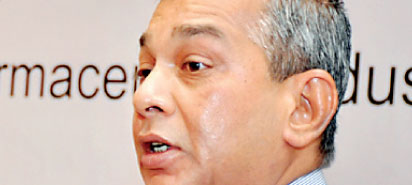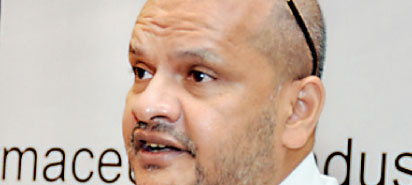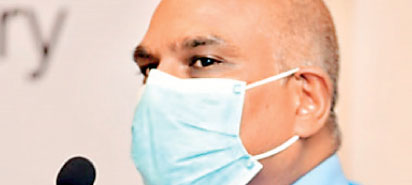Friday Feb 20, 2026
Friday Feb 20, 2026
Thursday, 3 March 2022 04:40 - - {{hitsCtrl.values.hits}}

SLCPI President Sanjiva Wijesekera

SLCPI Senior Vice President M. Prathaban

SLCPI Vice President Azam Jaward

SLCPI Past President Adrian Basnayake
By Darshana Abayasingha
The Sri Lanka Chamber of the Pharmaceutical Industry (SLCPI) yesterday lamented the lack of a pricing mechanism under the National Medicines Regulatory Authority (NMRA), which is affecting prices amidst a shortage of essential medicines due to the ongoing foreign exchange crisis. The chamber stated it incurs a cost of around $ 30 million monthly to import medicines to Sri Lanka.
The industry body noted that the unrealistic prices set by the NMRA are affecting supplies and stated: “A sustainable pricing mechanism will help adjust for key input costs changes such as the exchange rate, fuel costs, interest and inflation.
The NMRA has been requested by the court to establish a price mechanism that is sustainable both to the industry and the patient. This has not happened yet.” The SLCPI also charged there is a backlog and severe delays at the NMRA in granting approvals for re-registration of products, plus, new products.
Responding to queries posed by the Daily FT, the SLCPI agreed the industry cannot function with an umbrella price formula, as the purchase of different drugs entail diverse procurement and production processes, brands and other factors.
Its President Sanjiva Wijesekera said: “An appropriate mechanism will need to address all these factors, and one formula may not work and specialty products could be considered under different propositions.” He said the last price increase took place in August 2021, when the US Dollars was trading at Rs. 194, whereas the situation had changed dramatically since then, alongside the ongoing crisis. These factors had been presented to the Central Bank and the Minister in charge, but the industry was still awaiting positive movement in this regard, it was said.
The NMRA in 2019 initiated a digitisation process with the ICTA (e-NMRA) to streamline and fast-track applications and registrations.
When queried by the Daily FT on its effectiveness, the SLCPI revealed the NMRA has moved back to a manual system following the recent data controversy, and this has led to severe delays in functions.
With up to 85% of pharmaceutical products into Sri Lanka being imported, the current foreign exchange crisis in the country has increased the difficulty of importing essential medicines, and companies unable to pay their dues. As a result, suppliers are no longer interested in supplying to Sri Lanka, the SLCPI stressed.
Delays in opening letters of credit up until sufficient dollars are found has resulted in shipments being scheduled according to availability of dollars and not according to the needs of the patients, the industry warned.
“The wellbeing of our patients is our priority. During the pandemic, we demonstrated this by ensuring continuous supplies in trying circumstances. We are prepared to work with the Government and engage with relevant stakeholders to secure Sri Lanka’s immediate requirements for medicines and prevent medicine shortages, but solutions to dollar shortages and more importantly acceptable pricing mechanisms as well as immediately ironing out NMRA red tape for registrations are prerequisites,” the Chamber said.
Pix by Lasantha Kumara